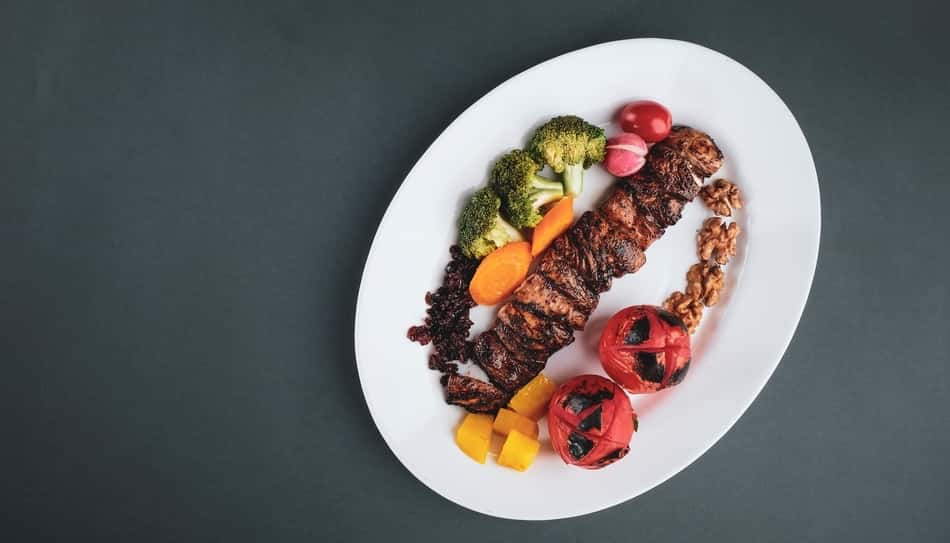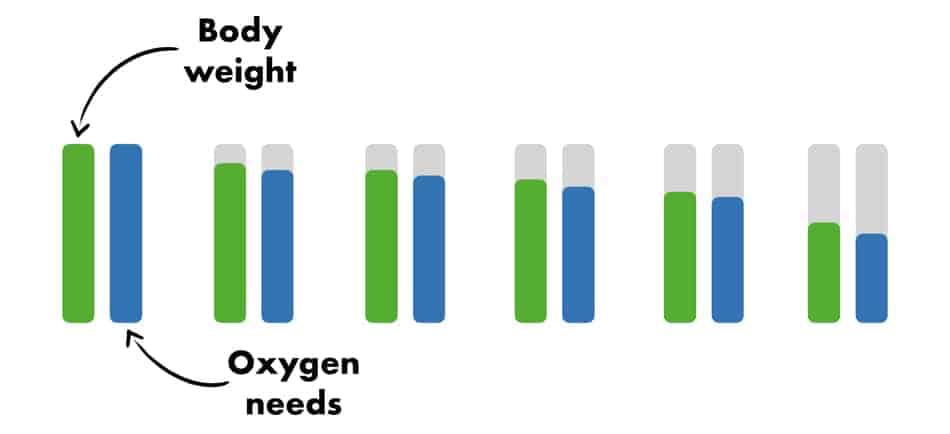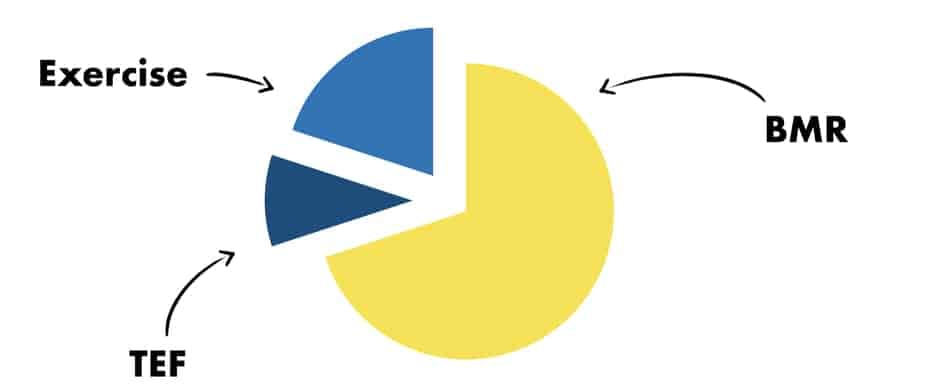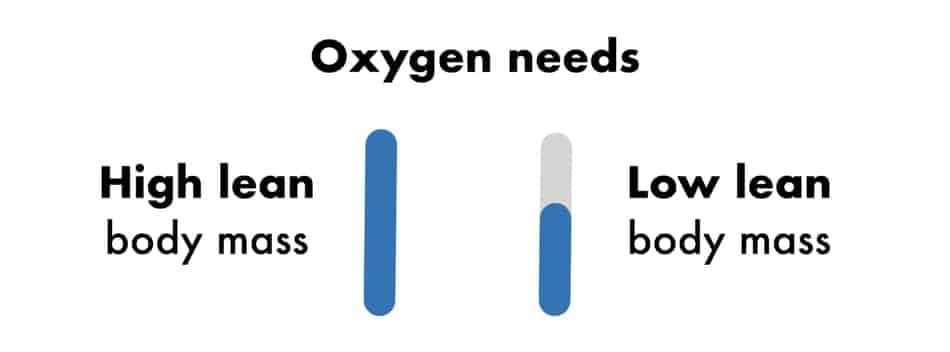If you’re counting calories to lose weight you may be wondering should you eat the same amount everyday?
You don’t have to eat the same amount of calories every day to lose weight because your energy expenditure depends on multiple dynamic factors that change day by day. Your basal metabolic rate, physical activity, and thermic effect of food can change every day, which will impact your calorie needs.
In other words, if your lifestyle changes day by day, it will have an impact on your daily calorie needs. But also, as your weight goes down, so does the metabolic rate.

Do You Have To Eat The Same Amount Of Calories Every Day To Lose Weight?
You don’t have to eat the same amount of calories every day to lose weight as long as you’re in a calorie deficit. Your calorie needs change daily, depending on your physical activity, the food you eat, and the lifestyle you have, therefore, your amount of calorie needs will vary.
Eating the same amount of calories every day may feel convenient as a way to lose weight. It’s kind of like a recipe for weight loss. Every time you follow the steps you get the same effect.
Not exactly.
The calories that you burn throughout the day are dynamic. This means your daily calorie needs will change, depending on your schedule, activities, stress, foods you eat, and the amount of weight you already lost.
Burning calories is all about oxygen consumption.

The more oxygen your body needs, the more calories you burn (source).
On the days where you have a high-energy demand, like a tough workout, long-distance traveling, public speaking, commuting, or being physically active in general, your body will use more calories.
On the days that are cognitively loaded and stressed-out, you will also burn more calories.
Also, keep in mind that once you already lost weight, your basal metabolic rate will decrease (source).

Basal metabolic rate is basically the number of calories your body needs to transport all the oxygen throughout the body.
And with less body weight, the demand goes down.
It’s kind of like driving a truck that is fully loaded versus a sedan on your own.
So once you eat the same amount of calories, initially you can see great progress. But after some time, your body metabolically adapts and reduces the need for oxygen consumption.
Therefore, your daily energy expenditure goes down. This means you burn fewer calories than before. There are of course some ways to keep your BMR high, despite calorie deficit.
What Happens When You Burn The Same Amount Of Calories You Eat?
When you burn the same amount of calories as you eat, you will keep the same weight because your body will be in the energy balance. If you burn more amount of calories than you eat, you will lose weight, and when you burn less amount of calories than you eat, you will gain weight.

Eating the same amount of calories as you eat means you don’t create either a calorie deficit or a calorie surplus. It means you stay with the same weight.
However, it is very difficult to know exactly how many calories your body uses because the calorie trackers are highly inaccurate. To really establish your calorie expenditure, you would need to know your BMR, TEF, NEAT, and physical activity.
BMR stands for basal metabolic rate and can only be calculated in a tight laboratory environment after a prolonged period of fast, where you’re measuring the amount of oxygen consumption (source).

TEF stands for thermic effect of food, which is the total amount of calories burned for processes like digestion, nutrient transport, enzymatic activity, absorption, and peristaltic mobility. So for instance, some foods like proteins require much more calories just to break down and digest, comparing to fats or carbs.
NEAT stands for non-exercise activity thermogenesis, which is the number of calories burned during unplanned, low-intensity activity that happens everyday (non including sleep or exercise).
Those are the things we do during the day like chewing gum, snapping fingers, walking with the dog, moving around the house, mowing the lawn, picking up objects, playing with kids, preparing food, showering, etc.
Physical activity is the number of calories we burn during purposeful exercise, which will vary depending on your lean body mass, age, and fitness level.
As you can see, it’s complicated.
So not only is hard to know the exact numbers, but those numbers also change throughout the day.
But you don’t need to know all that fancy numbers and have the exact data to lose weight. You just need to eat less and move more.
That’s why counting calories not only creates more confusion but is also provides inaccurate results.
If you wanna find out how to lose weight, without counting calories, check out my article on how to stop counting calories.
Does Everyone Burn The Same Amount Of Calories?
Everyone doesn’t burn the same amount of calories because everyone differs in body weight, lean body weight, age, physical activity, and hormonal balance. Younger people who are physically active and have more muscle mass will burn more calories than older people who are less physically active.
As we age, we tend to have less muscle and we tend to move less. There are some exceptions. A 60-year-old who is lifting weights, running marathons, and competing with 30 years younger people is pure inspiration.
But majority of people eat more and exercise less as they age.
Which is a mistake. But that’s a different conversations.
Also, people with higher lean muscle mass will burn a heck of a lot more calories than people with more fat mass.

Because muscle is metabolically expensive (it needs more oxygen). So just by having more muscle you actually burn more calories (source).
Also to move around is more calorie demanding for a lean person, comparing to the person who has more fat mass. So if you will have two people with the same exact age, same exact weight, but different muscle to fat ratio, walking the same distance at the same pace, the lean person will burn much more calories.
Just because of the higher lean muscle mass.
Hormones also play a role. The high amount of testosterone and growth hormone leads to more lean mass, higher muscle protein synthesis, therefore, more energy expenditure.
In Conclusion
You don’t have to eat the same amount of calories every day. However, it can feel more convenient and less mentally exhausting to eat the same calories every day. Which is fine.
But in the long haul, your body will adapt. And you won’t see the same results anymore.
So keep that in mind.
Frequently Asked Questions
Eating The Same Amount Of Calories As You Burn?
Eating the same amount of calories as you burn will maintain your body weight. The same amount of calories means you provide enough calories for your body to function properly. It doesn’t need to rely on the stored energy source, and it doesn’t have to store any excess.
Is It Bad To Burn More Calories Than You Eat?
It is not bad to burn more calories than you eat because it will create a caloric deficit. And if your goal is to lose weight, you want to be in a calorie deficit for a prolonged period of time, depending on the amount of weight you wanna lose.
If I Burn All The Calories I Eat Will I Lose Weight?
If you burn all the calories that you eat you will lose weight because the body creates a calorie deficit. And being in a calorie deficit will influence metabolic adaptations where the body starts to switch from using external sources of energy (food) to internal sources of energy (stored fat).
